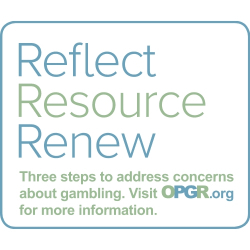Problem Gambling Prevention
Gambling is the act of risking money, or something else of value, on an activity with an uncertain outcome. Gambling is considered to be an addictive behavior, similar to substance use disorders.
What is problem gambling?
Problem gambling is any gambling behavior that has a bad effect on your life or the lives of people close to you - parents, brothers and sisters, your friends. If your gambling is causing your performance to suffer at school or work, increased interaction with corrections and/or law enforcement, arguments with family or friends, or worry about money you have lost, it is considered to be "problem gambling".
People who experience problem gambling are at higher risk for:
- Thoughts of suicide
- Click here for suicide prevention and crisis related resources
- Risk and protective factors for problem gambling and suicide can be shared
- Click here to learn more about suicide prevention risk and protective factors
- Substance use disorders
- Mental health disorders
- Physical health problems
- Relationship problems
Free help is available:
Free help is available for the person who is experiencing problem gambling AND for people impacted by someone may have a problem with gambling (family, co-worker, employer, friend, etc.).
- Go online to: Oregon Problem Gambling Resource (https://www.opgr.org/).
- Live chat or text: 9:00 a.m. to 9:00 p.m., Monday – Friday.
- Call: 1-877-MYLIMIT (1-877-695-4648), available 24 hours a day, 7 days a week.
- Go online to: Suicide prevention and crisis related resources and information.
- Call BestCare Treatment Services: 541-617-7365 or go online to: https://www.bestcaretreatment.org/gambling/
Watch for signs of possible gambling problems:
- An increase in other risky behaviors.
- Decline in performance at school or work.
- Spending less time than usual with family or friends.
- Worrying about money lost, or wanting to play more to win it back.
- Money or valuables are missing.
Deschutes County Health Services for Problem Gambling Prevention:
The Deschutes County Prevention and Health Promotion Team raises awareness in the community that gambling is an activity that carries risk. Staff build awareness in many settings where people study, work, play, and live, with a focus on populations who are most vulnerable to developing problematic gambling behaviors. Strategies to prevent problem gambling are embedded in school-based programs, suicide and substance misuse prevention programs, organizational policies designed to prevent problem gambling, and with community partner efforts. If you would like to learn more about how your program or organization can help, reach out to Julie Spackman at julie.spackman@deschutes.org or 541-388-6619.
Additional resources are available in the Supporting Documents and Links at the bottom of this page.

